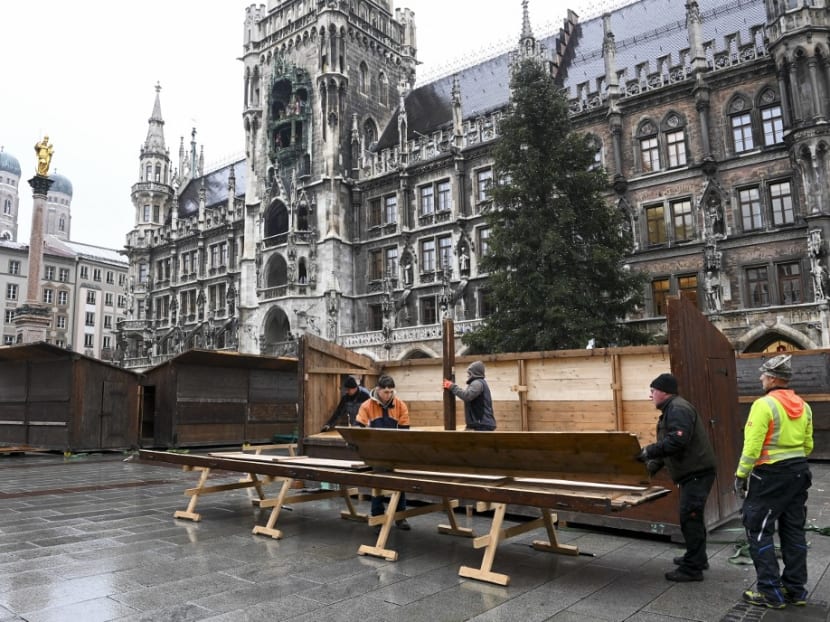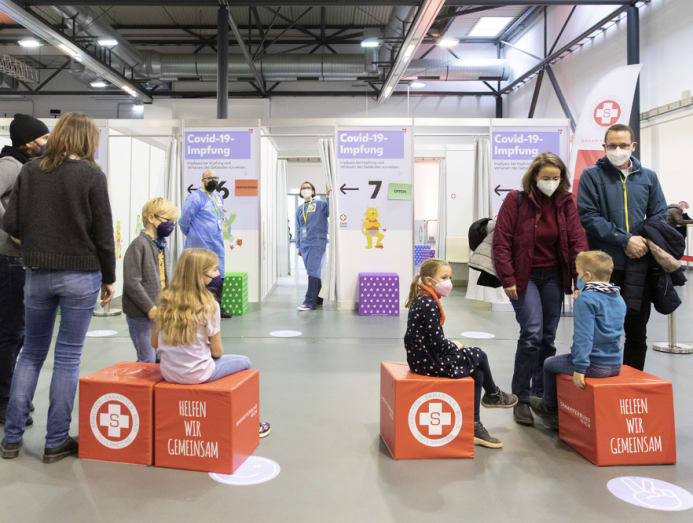Commentary: Singapore and Germany, two countries and one aim of living normally with COVID-19
The contrast between Singapore and Germany fades for Lavinia Thanapathy who moved to Berlin last year in the middle of a raging pandemic. If anything, it reinforces common pandemic lessons learnt, she says.

Workers dismantle a Christmas market booth at the Marienplatz in the center of Munich, southern Germany, on Nov 22, 2021, amid a surge of COVID-19 infections. (Photo: Christof STACHE / AFP)
SINGAPORE: Schadenfreude is a German word that means enjoying someone else’s misfortune.
It’s one of the best-known German words and means the same when used in English. It’s a useful word to keep in mind when discussing how other countries are dealing with the COVID-19 pandemic.
If the pandemic has taught us anything, it’s not to get too cocky about any wins. It rarely lasts for long. No one country is acing it.
MOVING TO GERMANY IN A PANDEMIC
I was in Singapore when the outbreak happened in March 2020. Singapore did all the right things. The world looked admiringly at our ability to handle the crisis.
When July 2020 came, I reluctantly left the safety of Singapore just as rules were first relaxed to move to Germany. My husband and I flew with masks and face shields through an empty Changi Airport. I’ve never seen it so desolate - no shops and barely any staff or services.
We arrived to an almost fully open Germany. We were in shock. People walked around without masks. Masks were and still are only required in public indoor spaces like public transport and malls.
There were no table size limits in restaurants. You could talk on public transport and music played in restaurants. People enforced their own safe distancing with withering looks.
Our shock turned into joy as we enjoyed the amazing German summer. We swam in lakes, walked through woods and enjoyed restaurants.
Without non-European Union tourists, German attractions were a delight. We visited sites like Neuschwanstein (the real-life Disney castle) in the fall.
Looking at the restrictions still in place in Singapore then, we were glad to be in Germany. Less liberal than Sweden’s business-as-usual approach, it seemed to have found a middle ground while avoiding overwhelming the healthcare infrastructure.
AND THEN WINTER CAME
Then the winter of 2020 came and it all went to hell in a basket.
Schools closed, restaurants closed, shops closed and people had to work from home. Germany’s famous Christmas markets shuttered and EU borders snapped shut just before Christmas thanks to the Delta variant.
It was a muted New Year’s. No more than two households could meet.
But 2021 brought with it the salvation and the controversy of vaccines. Germany tackled it logically. The over-90s, then 80s, essential workers and then everyone else.
By spring, almost everyone we knew had at least had their first shot. Infection numbers were down, shops were open, the kids in school and all was well in Germany again.
All through the summer and into yet another golden autumn, there was freedom to travel within the EU and life felt mostly back to normal. The idea people could live with COVID-19 blossomed.
But there were protests by “Querdenker” (alternative thinkers in Germany) who resisted masks, vaccines and lockdowns. During the depths of the 2020 winter lockdown, they even protested in rolling vehicle convoys to maintain mandated social distancing rules.
In September, the vaccinated travel lane (VTL) between Germany and Singapore opened. All my Singapore friends who have never thought to visit Germany visited in droves.
With the “3G” rules in place, you could go anywhere if you were vaccinated, recovered from COVID-19 or tested negative. Conventions, meetings and tourism revived in Germany as Singapore struggled with a puzzling rise in COVID-19 numbers and even more restrictions.
Then the tables turned.
Listen to a travel writer, sociologist and Expedia spokesperson on what’s behind hesitant public attitudes towards travel:
A FOURTH WAVE ACROSS EUROPE
You know how this story goes. You’ve been reading the news. Winter is coming. Germany and many of its neighbours are experiencing what is being called the fourth wave.
So what went wrong? Why does this feel like a bad re-run? Why was Europe so ill-prepared for this outbreak?
The outgoing Chancellor Angela Merkel even called it “dramatic”. She is the Queen of Calm. If she says its dramatic, then things are very bad indeed.
Some changes in Germany in October were said to have tipped the balance: Testing was no longer free and there were fewer centres. Kids were no longer required to wear their masks in classrooms though they’ve since reversed the change.
More international tourists arrived and people became complacent with vaccination rates stagnating in the high-60 per cent range. These, together with dropping temperatures, probably added to the unhappiness.
Most intensive care beds in Germany and in Singapore occupied by COVID-19 patients were unvaccinated patients. This is true almost everywhere.
This is possibly leading governments on the path of making the COVID-19 vaccine mandatory. Austria is the first country in the EU to announce that it will make the COVID-19 vaccination mandatory in 2022. It won’t be the last.

A GLOBAL RECKONING
Political leaders, health ministries and task forces have stumbled through their handling of this pandemic. Lockdowns, home-based learning, work-from-home, vaccination passes, VTL, quarantine and "maskne" (red bumps from wearing a mask for hours on end) are all now part of our vernacular.
Let’s be honest. No one got this right. But I’m not sure anyone could have.
What is certain is this pandemic has revealed the fault lines in each society it touched. Each had inequalities and inadequacies exposed. Poverty, bigotry, income and digital gaps, political instability – every country had to face its darkest and ugliest corners.
The COVID-19 vaccine got caught up in this global reckoning. Instead of heralding the end of the pandemic, it added a unique twist to this tragedy.
It became a battle of ideology instead of immunology. We seemed to not be able to grasp that this was never about personal choice or democracy. It was about public health and civic responsibility.
MORE PEOPLE NEED TO BE VACCINATED
More people need to be vaccinated. Even without the booster, being vaccinated puts us in a better position than being unvaccinated. I know this from my own family’s experience.
With two shots each, my 91-year-old father-in-law and 29 year-old stepdaughter both recovered from COVID-19 at home in Germany. They had cold symptoms and tested negative within a week.
Lothar Wieler, President of the Robert Koch Institute (RKI), Germany’s national public health institute, said in September that vaccinated people are far more protected. Hospitalisation reports demonstrated this.
In Singapore, the announcement came that the unvaccinated will have to foot their own medical bills from Dec 8 if they become ill from COVID-19.
The concern now is for school-going kids under 12. According to the RKI, children aged 10 to 14 currently form the largest group of COVID-19 cases in Germany, followed by the five to nine age group. RKI recorded 856 outbreaks in schools over the past four weeks.
Part of this is because children are self-testing at schools thrice a week and part of it is the transmissibility of the Delta variant. But mostly it is because kids under 12 are not eligible for COVID-19 vaccination yet.
There is finally some urgency to approve the vaccine for them and to roll it out as soon as possible.
German health minister Jens Spahn expects the EU to approve a child adjusted vaccine for five to 11-year-olds by the end of the week, with 2.4 million doses to be shipped to Germany from Dec 20. Singapore is studying doing the same in January 2022.
What should parents of young children consider in deciding whether to vaccinate them against COVID-19? Find out on Heart of the Matter:
Perhaps instead of schadenfreude, what nations need to do is to learn from each other. Some places are doing some things better. But no one is doing everything perfectly. Not even Singapore. Not even Germany.
Still, for both countries, the way forward is clear. We can have our lives and livelihoods back if more people get the vaccination, even if finding our footing can be challenging when marksmanship is an outcome of trial-and-error.
Both countries may come to an outcome of endemic living through different paths but we all want the same thing. We want to have social lives again. We want to travel again. We want to have weddings and celebrations.
No one wants COVID-19 to rob us of getting on with life.
Lavinia Thanapathy is a Singaporean author and speaker now living in Berlin, Germany.











